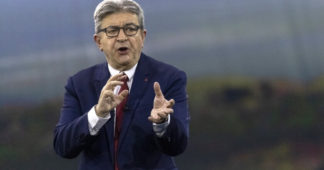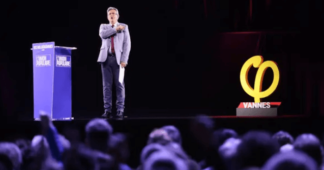Coming on the heels of the Élysée Palace race, France’s legislative elections are often seen as an appendix to the presidential contest, a sideshow designed to hand the freshly elected president a working majority. It’s an assumption veteran leftist Jean-Luc Mélenchon plans to shatter as he leads a rejuvenated left-wing coalition into battle, aiming to force President Emmanuel Macron into an uncomfortable “cohabitation”.
Jun 8, 2022
Just weeks after re-electing Macron as their president, French voters return to the polls over the next two Sundays to renew the country’s National Assembly – the epilogue to a protracted election cycle made suspenseful by one man’s dogged refusal to yield.
At the end of the April 10 presidential first round, Mélenchon – a fiery leftist who narrowly missed making it to the run-off – appeared to be bowing out as he concluded an emotional concession speech with a call on youngsters to take up the baton. His last words – “faites mieux” (“do better”, or “succeed where I failed”) – fuelled speculation that the hard left’s tireless campaigner might finally throw in the towel.
In the end, talk of Mélenchon’s “retirement” lasted just nine days.
By the time Macron crushed Marine Le Pen – for the second time – in a lopsided April 24 presidential run-off, Mélenchon had already barged his way back into the ring, defying custom and protocol to claim the prime minister’s job for himself. To that end, he urged voters to give his party a majority in parliamentary polls, often dubbed the “third round” of France’s two-round presidential election.
Never mind the fact that presidents alone appoint prime ministers under France’s constitution – not parliament, nor the people, let alone oneself. Mélenchon’s brash call on voters to “elect (him) prime minister” thrust the 70-year-old back at the heart of the political debate, effectively sidelining the looming Macron-Le Pen rematch. It also guaranteed he would dominate the run-up to legislative elections just as he bossed the final stretch of the presidential campaign.
“Jean-Luc Mélenchon pulled off an extraordinary PR coup,” said Pascal Perrineau, a professor of political science at Sciences-Po Paris. “Asking the French to elect him prime minister might sound absurd, but it was an extremely shrewd strategy. It allowed him to both supplant Le Pen as Macron’s chief opponent and cast himself as the pillar of a revamped left.”
The PR stunt was soon followed by another tour de force, which even critics have hailed as a masterstroke. In the days following Macron’s re-election, Mélenchon and his team engineered what many had come to see as an impossible feat: a broad alliance of France’s deeply fractured left, united around a common policy platform and fielding a single candidate in each of France’s 577 constituencies.
With just days to go before the first round of parliamentary elections on June 12, that coalition is polling neck-and-neck with Macron’s bloc, raising fears for the ruling party that it may fail to secure the absolute majority it looked guaranteed to win only weeks ago.
A resurgent left
Just as it helped Macron in the presidential contest, France’s two-round system of voting is likely to favour the ruling party’s candidates in parliamentary run-offs on June 19, their centrist pitch being ideally positioned to draw support from left or right, depending on the adversary. Still, Mélenchon’s gamble has helped redraw the political map and alter the balance of power.
The recent presidential election signalled the emergence of three camps of roughly equal weight: a centre-right bloc gravitating around the incumbent president, a far-right bloc dominated by Le Pen, and a scattered left that tried – and narrowly failed – to prevent a 2017 Macron v. Le Pen rematch. Paradoxically, it is the latter bloc that has bounced back in recent weeks, tossing aside the common assumption that the winner of the presidential contest necessarily has the momentum.
“The far right is divided, Le Pen has shown little appetite for legislative elections, the mainstream right is virtually inaudible, and Macron’s camp has precious little to say aside from attacking Mélenchon – which is a bit thin for a political platform,” said Michel Wieviorka, a sociologist and professor at the École des Hautes Études en Sciences Sociales (EHESS).
“Mélenchon is the only one who has energised this campaign and his left-wing bloc is currently the force with momentum on its side,” Wieviorka added.
Known by the somewhat awkward acronym “Nupes” (for Nouvelle Union Populaire, Écologique et Sociale), the coalition of the left is unprecedented in its breadth, encompassing Mélenchon’s La France insoumise (France Unbowed, or LFI) as well as the Greens, Communists, Socialists and other smaller groups. It is also the first such alliance to gravitate around the hard left, rather than the more moderate Socialists, leading critics to lament the centre-left’s “submission” to Mélenchon’s Insoumis.
Astonishingly, the Nupes coalition includes bitter foes who spent much of the presidential campaign lambasting the veteran leftist rather than Macron. Personal and policy differences have nurtured suspicions that the bloc is little more than an alliance of convenience. Either way, the ability to bind them together marks a spectacular turnaround for Mélenchon, who has previously taken much of the blame for the left’s crippling divisions.
“The Nupes is perhaps a motley crew but it has given visibility and momentum to a moribund left,” wrote the left-leaning daily Libération in an editorial on Tuesday. “Jean-Luc Mélenchon may well fail to fulfil his dream of becoming prime minister, but he has succeeded in building an opposition that quashes all others.”
Talking up the left’s chances
Mélenchon has repeatedly stressed that his prime ministerial ambition is not a “dream” – but a credible prospect. He has opted not to seek re-election to the National Assembly, surrendering his seat in Marseille. Instead, he has chosen to be everywhere at once, holding campaign rallies and press conferences up and down the country to drum up support for Nupes candidates.
At each stop, Mélenchon has talked up the coalition’s prospects, no doubt mindful that a lack of belief in his own presidential hopes – coupled with the fact that pollsters underestimated his final score by a massive 5 points – may well have cost him a place in the April 24 run-off.
“If people think we can win, they’ll go out to vote in droves,” he told a crowd of several hundred at a campaign stop in Paris last week. Victory for Nupes is “highly likely”, he said days later in a suburb of Lyon. At every opportunity, he has detailed the coalition’s policy proposals, which include restoring a wealth tax scrapped by Macron, lowering the retirement age to 60, and hiking the minimum wage by 15 percent.
Meanwhile, his aides have defended Mélenchon’s unorthodox decision to claim the PM’s job, stressing the need to give the election visibility at a time of growing abstention and voter disaffection. As his campaign director Manuel Bompard put it, the idea is to “give voters a clear and readable objective to make this election relevant”.
An electoral ‘accident’
The LFI leader’s ubiquity on the campaign trail has contrasted sharply with Macron’s discretion and that of his entourage, including his newly appointed prime minister, Elisabeth Borne.
While Mélenchon swiftly cobbled together a broad coalition and an ambitious platform for the legislative elections, Macron dithered at length over the composition of his reshuffled cabinet. When he finally made up his mind, he promptly instructed his new ministers to keep a low profile and steer clear of campaign mishaps.
“This low-profile strategy has backfired,” wrote the Journal du dimanche, France’s leading Sunday paper, adding that “the government’s deafening silence has turned into an echo chamber” for damaging incidents: first the accusations of sexual assault levelled at one minister, then the chaos that marred the Champions League football final near Paris in late May, tarnishing France’s image across the globe.
Recent polls have served as a wake-up call for the ruling party, spurring calls to take the parliamentary vote seriously. On Tuesday, a survey by the Ifop group suggested Macron’s Ensemble (Together) coalition would win between 250 and 290 seats, likely below the 289 needed for a majority. The Nupes coalition was seen making major gains with 170-205 seats, the poll suggested. Another poll by Ipsos on Wednesday put the ruling camp at between 275 and 315 seats.
The Élysée Palace is also alarmed by results from early elections in overseas constituencies that are normally considered safe seats for Macron’s candidates. After the first round of voting, the ruling party led in most areas but faced a much stronger challenge from the left compared with five years ago, pointing to uncomfortably close run-offs next week.
“We’re taking [the threat] seriously because in the media and in the polls the only person who exists, apart from the presidential majority, is Jean-Luc Mélenchon,” Aurore Bergé, a senior ruling party MP, told France 2 television, describing the left-wing alliance as the only “strong and credible” alternative to the government. Her colleague Patrick Mignola, from the Macron-allied MoDem party, expressed fears of an “electoral accident” in the two-round parliamentary elections.
Counter-balancing the president’s powers
Talk of a possible “accident” reflects the ingrained tendency to view legislative elections as an appendix to the presidential contest – an almost procedural ritual designed to hand the president a workable majority. In the words of Olivier Véran, the minister for parliamentary affairs, failure to give Macron a majority in the National Assembly would represent a “major destabilisation of politics in our country for years to come”.
That is precisely the scenario Mélenchon and his allies are aiming for, hoping to clinch a majority of seats and force Macron into appointing a left-wing government. No poll has yet predicted such an outcome. Analysts say it is highly unlikely, though not impossible. Pollsters are urging caution, stressing that even small differences in turnout could swing results one way or the other.
France has not had a president and a parliamentary majority from different parties since 1997-2002, when right-wing president Jacques Chirac ended up having to work with Socialist premier Lionel Jospin after calling an ill-judged snap election. A constitutional change in 2000 was meant to prevent such “cohabitations” by moving the parliamentary elections to immediately after the presidential ones.
Since then, French voters have invariably given their presidents a parliamentary majority, reinforcing the notion that parliamentary votes are supposed to uphold the presidential verdict. Such precedents mean a majority for Macron is “likely but not automatic”, Wieviorka cautioned, adding that voters had also expressed a desire “not to give the president free rein in parliament”.
While Macron ultimately trounced Le Pen in the presidential run-off, his victory was tarnished by the lowest turnout in half a century. Only one in five registered voters backed the incumbent in the first round on April 10 – a more accurate indicator of his support across the country. A poll by the BVA group last week found that only 35 percent of voters wanted Macron to have a parliamentary majority, reflecting the sharply fractured nature of the electorate.
“Macron’s camp is still the likeliest to win the legislative elections,” Wieviorka added. “But polls also suggest that French voters are not inherently opposed to a ‘cohabitation’ and a parliament that counter-balances the president’s powers.”
We remind our readers that publication of articles on our site does not mean that we agree with what is written. Our policy is to publish anything which we consider of interest, so as to assist our readers in forming their opinions. Sometimes we even publish articles with which we totally disagree, since we believe it is important for our readers to be informed on as wide a spectrum of views as possible.











